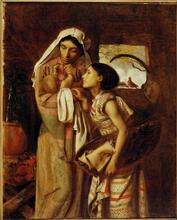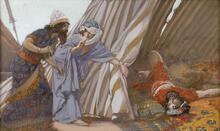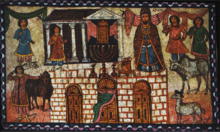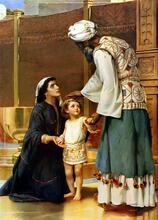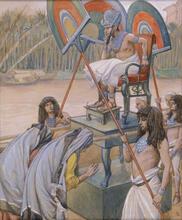Shiphrah: Midrash and Aggadah
Shiphrah (more commonly spelled "Shifra") was one of the two Hebrew midwives (Shiphrah and Puah) who delivered the children of the Israelites during the Egyptian servitude. The Torah chronicles (Ex. 1:15–21) that they disobeyed Pharaoh’s command and did not kill the Israelite male newborns. Apart from this stalwart act, the midwives are not mentioned elsewhere in the Exodus narratives, nor in the entire Bible. The Rabbis identify the midwives with various Biblical heroines, thereby transforming them from secondary characters to central, fully developed figures whose annals spread over additional chapters of the Torah.
Identity
According to one Rabbinic position, Shiphrah and Puah were mother and daughter: Jochebed and Miriam; and according to another view, daughter-in-law, and mother-in-law: Jochebed and Elisheba daughter of Amminadab. In both identifications, these are prominent Hebrew women who were celebrated for their righteousness.
These identifications are based on the Biblical account that the midwives did not obey the royal edict because they feared God. Additionally, God rewarded them for their actions, as verse 21 attests: “He established households [batim] for them,” which the Rabbis understand as priestly and Levitical households, or as royal households. This in turn led the exegetes to conclude that the midwives related to the leadership of the generation that went forth from Egypt, along with the priests and Levites. Jochebed, Miriam and Elisheba were indeed related to these leading families (BT Suspected adulteressSotah 11b).
However, according to one unique tradition, Shiphrah and Puah were non-Jewish midwives, who were said to be pious women and true converts (A type of non-halakhic literary activitiy of the Rabbis for interpreting non-legal material according to special principles of interpretation (hermeneutical rules).Midrash Tadshe, Ozar ha-Midrashim [Eisenstein], p. 474). This tradition would read the phrase “the Hebrew midwives” as “the midwives of the Hebrew women.”
Most of the Rabbinic traditions identify Shiphrah with Jochebed; she was called “Shiphrah” because she would cleanse (meshaperet) the newborn by washing it and cleaning it after birth; another etymological explanation is that the Israelites were fruitful [she-paru] and multiplied in her time because of her or that she herself was fruitful and multiplied (Sifrei on Numbers, para. 78).
According to another tradition, she shiprah her actions before God (i.e., performed good deeds that were pleasing to the Lord). Another midrash relates that she smoothed over (shiprah) her daughter’s words: Puah had spoken impudently to Pharaoh, who sought to kill her in his anger. Shiphrah placated him, saying: “Do you pay attention to such a one as her? She is a witless baby.” Another tradition bases its explanation on Job 26:13: “By his wind the heavens were calmed [shifrah].” The verse describes the heavens that were created by God for Israel, and it was Shiphrah who returned Israel to their Father in heaven (Eccl. Rabbah 7:3; Ex. Rabbah 1:13).
Defying Pharaoh
The Rabbis maintain that when Pharaoh commanded the midwives to kill the sons, he also taught them the secrets of the birth process, to aid them in implementing his decree. When he told them (Ex. 1:16): “[…] look at the birthstool [ha-avnayim, literally, stones],” he entrusted them with an important sign, namely, that when a woman is about to give birth, her thighs become as cold as stone, thus teaching them when her time was near. When he ordered them (Ex. 1:16): “if it is a boy, kill him,” he gave them an additional important sign, for a male child comes out with his face turned downward, looking at the earth from which he was created, while a female is born with her face turned upward, looking at the rib from which she was formed. Thus the midwives would know the sex of the infant, already at the beginning of the birth (BT Sotah 11b; Ex. Rabbah 1:14).
Another tradition relates that Pharaoh decided to kill the males on the advice of his counselors. God told him: Whoever gave you this counsel is a fool. You should have killed the females. If there are no females, from where will the males take wives? One woman cannot marry two men, but one man can marry ten or a hundred women! Of such foolish advisors, it is said (Isa. 19:11): “Utter fools are the nobles of Tanis; the sages of Pharaoh’s advisors [have made] absurd predictions. How can you say to Pharaoh, ‘I am a scion of sages, a scion of Kedemite kings’?” (Ex. Rabbah, loc. cit.).
The Rabbis maintain that when Pharaoh summoned the midwives to his palace, he sought to seduce them, which they derive from the wording of verse 17: “[The midwives] did not do as the king of Egypt had spoken to them [aleihen],” instead of as he “told them [lahen].” This implies that he wanted to engage in intercourse with them (la-vo aleihen), but they refused his advances (BT Sotah 11b).
The Torah she-bi-khetav: Lit. "the written Torah." The Bible; the Pentateuch; Tanakh (the Pentateuch, Prophets and Hagiographia)Torah tells (v. 17) that the midwives did not heed Pharaoh, and “did not do as the king of Egypt had spoken to them; they let the boys live.” The Rabbis ask why it was necessary to write “they let the boys live,” if Scripture already stated that the midwives did not do the king of Egypt’s bidding. They answer that the end of the verse teaches that not only did they not kill the boys, but they also actively aided them to live, by giving them food and water (BT Sotah, loc. cit.). The midrash explains that if the midwives saw poor women, they would go and collect food and water from the houses of wealthy women, which they gave to the poor ones, thus enabling them to provide for their children.
Another midrash relates that the midwives knew that fetuses are liable to be harmed during the delivery and be born with some physical defect. They therefore stood and prayed: “Master of the Universe, You know that we did not fulfill Pharaoh’s edict, but we seek to fulfill Your word. Master of the worlds, may the child emerge unscathed, so that the Israelites will not find a reason to speak against us, saying that we wanted to kill them, and they were born with defects.” God immediately accepted the prayer of the midwives, and all the children were born without flaw. According to an additional tradition, in order to avoid such mishaps during the course of the delivery, the midwives prayed to God, saying: “Master of the worlds, Punish them for their sins now [i.e., in some way other than by death], and give them life, so it will not be said that we killed them by order of Pharaoh.” God did as they requested and let both the mothers and the children live (Ex. Rabbah 1:15).
Midrashic Analysis
The Rabbis inquire concerning the nature of the excuse given to Pharaoh by the midwives in v. 19: “Because the Hebrew women are not like the Egyptian women: they are vigorous [hayyot].” This cannot mean that the Hebrew women themselves were midwives (one meaning of the word hayyot), since the midwife herself requires another midwife to give birth. Rather, they told Pharaoh that this nation is like the beasts (hayyot) of the field; the women, who are like beasts, do not need the help of any human. Thus, in Jacob’s blessing to his sons in Gen. 49, Judah is compared to a lion’s whelp, Dan to a serpent, Naphtali to a hind let loose, Issachar to a strong-boned ass, and so forth.
The Torah (Ex. 1:20) narrates that God rewarded the midwives for fearing Him, “And God dealt well [va-yetev] with the midwives.” What is the reward for fear of God? Torah. By merit of Shiphrah’s fear of God, Moses was descended from her. This is learned from the similar language of the verse (Ex. 2:2) relating to the latter: “when she saw how beautiful [tov] he was”; also, Moses was the vehicle for the transmission of the Torah, which Scripture (Prov. 4:2) calls “good [tov] instruction.” Another tradition states that as reward for Shiphrah’s deeds, the priestly and Levitical houses of Aaron and Moses would come from her. Yet another tradition understands this divine boon to the midwives as Pharaoh’s believing them and not harming them after they failed to implement his edict (Ex. Rabbah 1:16–17). “It is for her fear of the Lord that a woman is to be praised” (Prov. 31:30) refers to these God-fearing women (Ex. Rabbah 1:15).


